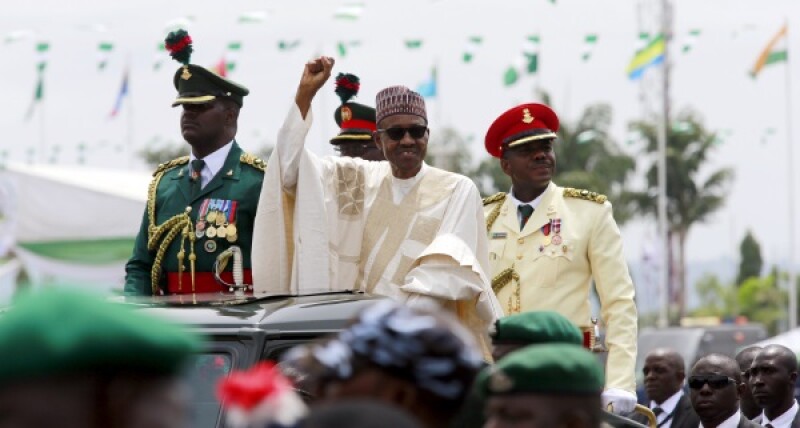
|
Nigeria's new president Muhammadu Buhari greets his supporters |
Euromoney has already pointed out that Nigeria’s transition into legitimate democracy – masterfully illustrated by the peaceful election in March where the incumbent Goodluck Jonathan graciously accepted defeat to his rival Muhammadu Buhari – could soon come under pressure. And just a couple of months after the election, cracks are starting to show.
The depressed oil price, felt the world over, is beginning to take its toll in Nigeria, Africa’s largest crude oil producer. Nigeria’s oil revenues are due to decline by 23% year-on-year in 2015, and will account for around 49% of the government’s total revenue. This marks a substantial drop, from around 58% in 2014 and 66% in 2013.
For Nigeria’s new leadership to begin to focus on election promises – including a crackdown on corruption, creating jobs for the country’s 30% unemployed population, reducing poverty and stabilizing the weakening currency – the government’s primary plan will have to focus on extracting revenue away from the oil and gas sectors by boosting government receipts, slashing expenditure and even issuing more debt to make up for the shortfall.
While Nigeria’s political landscape is going through substantial change, so is its financial and economic landscape.
To raise revenue, Nigeria will probably need to act fast in getting rid of expensive oil subsidies, which cost the government around $7 billion in revenue each year. While this has been on the agenda for some time, post election and with depressed oil prices, this will be easier to commit to.
Perhaps one of the better ways to increase government revenues, relatively quickly, would be for Nigeria’s new government to increase VAT. As it stands, VAT in Nigeria accounts for 4% of government revenue and at 5% is one of the lowest levels in the world. If Nigeria were to double VAT to 10%, this would compensate for 31% of the decline in oil revenues, according to African Alliance, making it the most effective way to raise government receipts. Indeed, 10% VAT would still be a lot lower than some of Nigeria’s sub-Saharan African peers such as Kenya and Ghana.
But as with all such policies, there would be some unwanted side effects. Raising VAT would hit consumer-driven companies and then be passed on to customers. The poorest in Nigeria – the people Buhari has claimed to fight for – would be hit the hardest. So, as Nigeria’s all important oil revenue falls, Nigeria’s poorest will struggle, as less revenue will be available to fight inequality. But if VAT is increased, their consumer power will be hit. Either way, it would seem that Nigeria’s most vulnerable are in for a difficult time.
Buhari’s new government will need to spend time fine-tuning policy and tax changes before it will be able to tackle popular election promises. Other tools open to Nigeria would be to raise duties on alcohol, increase tariffs on imported rice and sugar or even raise corporate taxes. While increasing VAT may be a more straightforward action, the government would do well to introduce various changes into the mix. The legitimacy of his election campaign may depend on it.